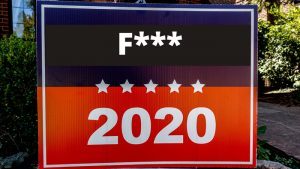Expression is Essential to Liberty
Free speech may be Americans’ most cherished First Amendment freedom.
A hallmark of democracy, free speech allows people to criticize the government without fear of being punished.
Free speech unleashes comedians to poke fun at our leaders and musicians to express themselves in song. It lets activists, athletes and actors speak out and protest injustice.
Free speech sets the stage for fiery presidential debates and allows campaign ads that are sentimental or searing.
There are limits to free speech. Congress can’t restrict your right to express yourself, but your employer can.
And while social media can be a freewheeling forum for free speech, Facebook and Twitter are cracking down on content that spreads falsehoods or hate speech.
Free speech is everywhere, but not all speech is protected by the First Amendment.
What is freedom of speech?
Free speech is the different ways that we express ourselves. It is what we say, write, wear, watch, listen to and post. It is standing or kneeling during the National Anthem. It is waving the flag on your front porch or burning it in the street. Free speech comes in a variety of expressions.
Freedom of expression is essential to individual liberty and contributes to what the Supreme Court has called the marketplace of ideas. The First Amendment assumes that the speaker, not the government, should decide the value of speech.
This freedom protects expression of our individual values, ideas and opinions and prevents the government from stifling not just the spoken word, but any way we reach out to others. The government cannot control or punish any of us for what we choose to say, with very few exceptions. The government cannot silence any of us for our views or the way in which we chose to speak – subject to reasonable “time, place and manner” rules so we don’t unfairly intrude on others’ rights.
Which types of speech are not protected by the First Amendment?
Unprotected speech generally falls into these categories:
- Commercial (advertising) speech
- Obscene speech
- Student speech
- Defamation
- National security
- Inciting imminent lawless violence
- Fighting words
- True threats
What is obscene speech?
The Miller test set the standard for determining if speech is obscene. It comes from the Supreme Court’s 1973 decision Miller v. California. The court provided three basic guidelines:
- Whether the average person, applying contemporary community standards, would find that the work, taken as a whole, appeals to the prurient interest.
- Whether the work depicts or describes, in a patently offensive way, sexual conduct specifically defined by the applicable state law.
- Whether the work, taken as whole, lacks serious literary, artistic, political, or scientific value.
These different guidelines are sometimes called the prurient-interest, patently offensive and serious-value prongs of the Miller test.
Perspective: No, It’s Not a Crime to Write “F*** Biden” — It’s F*** Speech
We are free to curse at our leaders thanks to the First Amendment.
Read MorePerspective: Students, Parents and Free Speech Win in Cheerleading Case
Snapchatting cheerleader lands significant victory for student First Amendment rights.
Read MoreCan Facebook, Twitter and other social media sites censor my content?
Yes, they can. Social media sites have First Amendment rights just like you. If your post goes against the company’s policies, they have the right to remove your content. Remember, the First Amendment protects us from the government limiting our speech, not private companies.
What is cancel culture?
The short answer is free speech. While so-called cancel culture can have a chilling effect, which can stop some forms of speech, it is also people using their free speech rights. More speech is always better than less speech, though. So even if someone is using speech you don’t like, responding to it is better than shutting them down.
Cancel Culture: Censorship, Civil Right or Something Else?
There’s no shortage of passionate opinions about cancel culture and no real agreement on what canceling means.
Read MoreIs hate speech protected by the First Amendment?
Yes, hate speech is a form of protected speech. Those who find an idea, epithet, literary work or other form of expression offensive can oppose, counteract and perhaps refute it with further speech — not by banning the speech deemed to be offensive.
As Supreme Court Justice Louis Brandeis said in a famous quote, “If there be time to expose through discussion the falsehood and fallacies, to avert the evil by the processes of education, the remedy to be applied is more speech, not enforced silence.”
Attitudes on protecting hate speech could be turning, though. Our recent Where America Stands survey found that less than a third of Americans think it should be protected.
‘More Speech, Not Enforced Silence’
It is tempting to call for the censorship of speech we don’t like, but we have another option.
Read More


